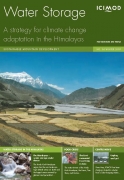 This report by the International Centre for Integrated Mountain Development (ICIMOD) highlights the phenomenon of climate change and argues that water storage will be a key strategy for climate change adaptation in the coming years.
This report by the International Centre for Integrated Mountain Development (ICIMOD) highlights the phenomenon of climate change and argues that water storage will be a key strategy for climate change adaptation in the coming years.
The report discusses the importance of the Hindu Kush Himalayan ranges as an important source of water to a large section of the population and warns of the impending crisis of water scarcity and food insecurity in the regions of Asia, if water harvesting and conservation efforts are not undertaken. The document argues that water storage thus becomes a central issue, which is very complicated to implement, particularly in the Hindu Kush Himalayan region.
The report goes on to highlight the limitations in using water sources such as glacier lakes and high altitude wetlands in the Hindu Kush Himalayan ranges for storage because of poor access and infrastructural needs, and dwells on the use of water storage at the farm level in the mountains as a viable option. The document argues that watershed development could be a very important option where farmers can become future water managers.
The report argues for the need to understand the importance of traditional wisdom, where farmers in water stressed areas have developed elaborate systems of water storage and governance and argues for the need to encourage new ways of thinking and research that combine traditional knowledge and experiences with high end technology that can lead to innovative ways of storing water in the mountain ranges.
Download the report from the ICIMOD website here.
/articles/water-storage-strategy-climate-change-adaptation-himalayas-report-icimod